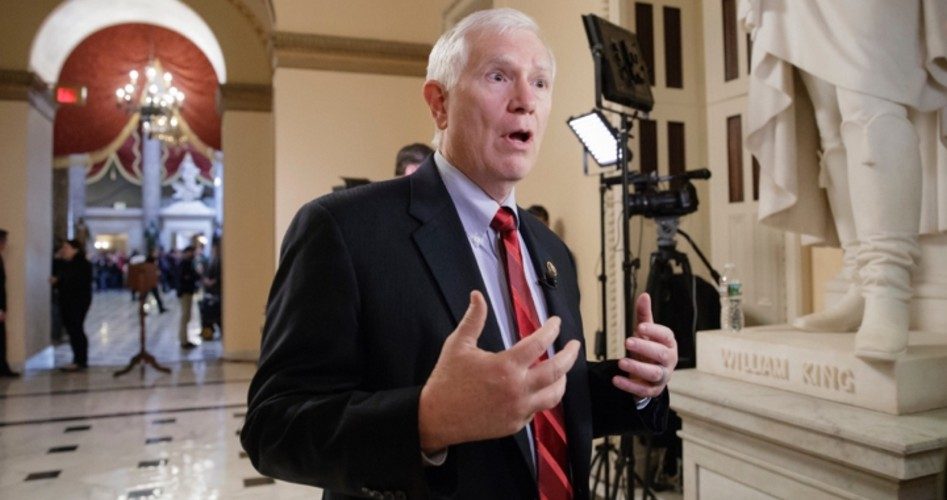
An Alabama congressman who opposed the Republican leadership’s flop ObamaCare replacement bill has introduced legislation to do what he thinks the GOP should have done in the first place: repeal ObamaCare outright.
The ObamaCare Repeal Act, introduced by Representative Mo Brooks (R-Ala.; shown), erases ObamaCare from the books in the simplest way possible. It states that effective at the end of 2017, both the Patient Protection and Affordable Care Act and the Health Care and Education Reconciliation Act of 2010, the two laws signed by President Barack Obama to enact the policies colloquially known as ObamaCare, are “repealed, and the provisions of law amended or repealed by such Act[s] are restored or revived as if such Act[s] had not been enacted.”
Brooks announced he would be introducing the bill in a Friday press release that also reiterated his intention to vote against the House leadership’s American Health Care Act (AHCA), which he called “ObamaCare 2.0.” That bill ended up being withdrawn when it became clear that Brooks and likeminded colleagues had the votes to torpedo it.
The House Freedom Caucus, of which Brooks (cumulative Freedom Index score: 74 percent) is a member, took much of the blame for the failure of the AHCA. After House Speaker Paul Ryan (R-Wis.) pulled the bill Friday afternoon, Representative Michael Burgess (R-Texas), the chairman of the Energy and Commerce subcommittee on health, told the New York Times, “The Freedom Caucus wins. They get ObamaCare forever.”
But the Freedom Caucus had good reason to oppose the AHCA. As Brooks put it in his press release, the bill did not repeal ObamaCare but instead “include[d] the very ObamaCare policies that jack up health care costs beyond the reach of so many struggling American families.” Brooks declared the bill “the largest Republican welfare plan in the history of the Republican Party,” saying it was “horribly expensive” and would have turned “tens of millions of Americans into welfare dependents.” The legislation, he averred, had “more bad policy than any bill I have ever faced.”
Besides, the notion that the defeat of one highly flawed and unpopular bill — one that the leadership tried to ram through in 16 days — represents a squandering of the last chance for ObamaCare repeal is nonsense. It took Democrats years of shaping public opinion and months of hammering out legislation to pass ObamaCare. If it takes Republicans a few more months to repeal it, the wait will have been worth it.
There remains, however, the question of whether Republicans really want to repeal ObamaCare. “A lot of Republican Congressmen campaigned to repeal ObamaCare, voted in 2015 to repeal ObamaCare (when it did not matter because of President Obama’s veto), yet insisted on preserving the worst of ObamaCare in ObamaCare 2.0,” observed Brooks. Some fear voters’ wrath for taking away privileges to which they have now become accustomed, such as being able to force insurers to cover them at below-market rates regardless of pre-existing conditions. Others have no substantive disagreement with ObamaCare — a significant portion of it, after all, was originally a Republican idea — and only oppose it out of partisanship. “These Republican Congressmen who publicly oppose ObamaCare yet support it behind closed doors constitute a ‘Surrender Caucus’ that hopes the ObamaCare issue will simply go away,” said Brooks.
GOP leaders and President Donald Trump gave every indication of throwing in the towel on repeal after the AHCA was withdrawn, which means it’s up to the rank-and-file to force the issue, and Brooks is taking up the challenge.
Brooks isn’t the first congressman this session to propose a bill that actually repeals ObamaCare. That honor surely goes to Representative Steve King (R-Iowa), who introduced his own ObamaCare Repeal Act on January 3, the first day of the session. Brooks is a cosponsor of that bill, which is currently wending its way through various committees.
The Alabama congressman clearly fears that King’s bill will be stymied by the “Surrender Caucus,” which he said controls “key legislative positions.” Therefore, he hopes to bypass the usual legislative process, which could see his bill bottled up in committee forever, by circulating a discharge petition for it. If enough of his colleagues sign the petition, his bill will automatically be brought to the floor for a vote.
“If the American people want to repeal ObamaCare, this is their last, best chance during the 115th Congress,” said Brooks. “Those Congressmen who are sincere about repealing ObamaCare may prove it by signing the discharge petition. At a minimum, the discharge petition will, like the sun burning away the fog, show American voters who really wants to repeal ObamaCare and who merely acts that way during election time.”
Photo of Rep. Mo Brooks: AP Images


